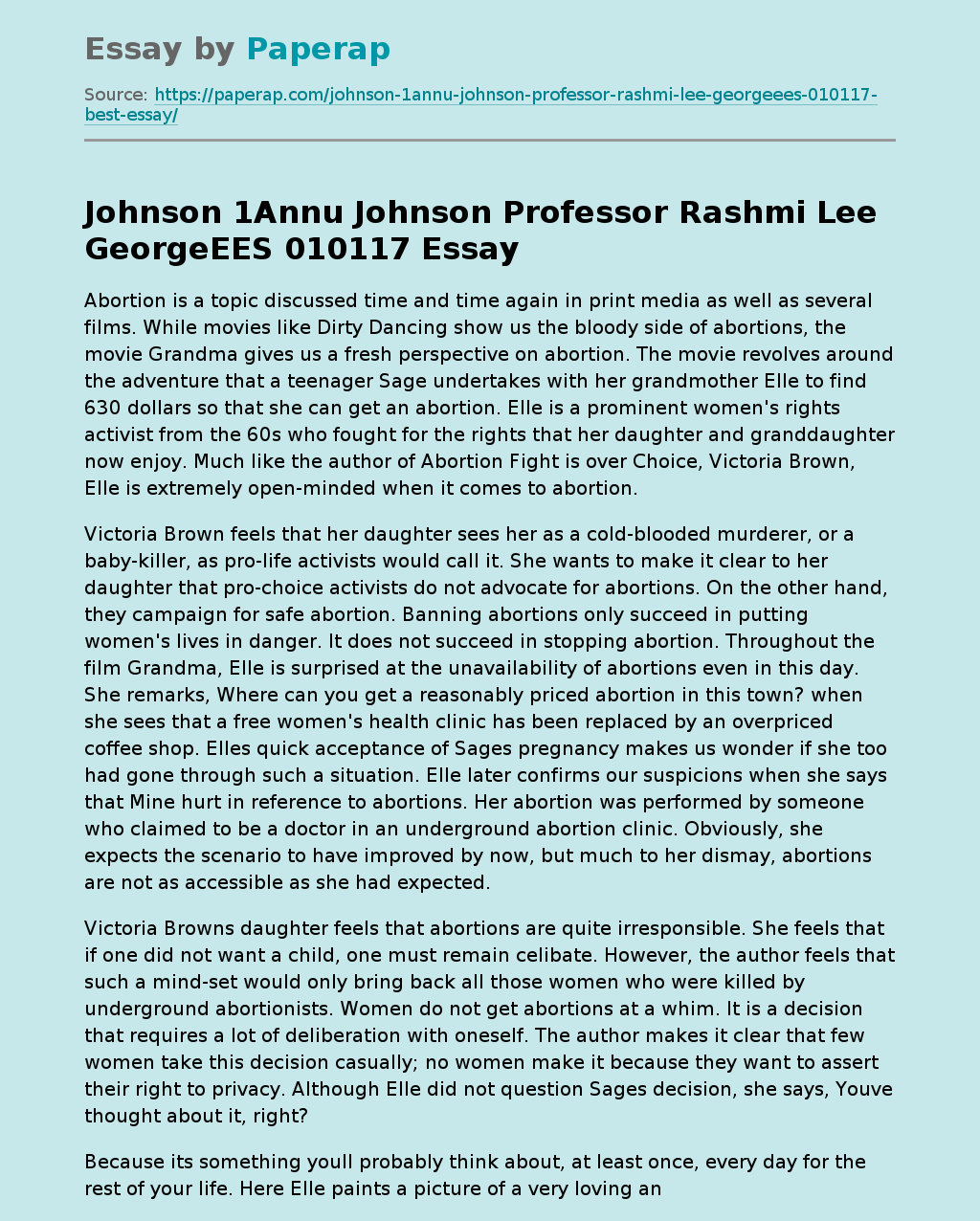Johnson 1Annu Johnson Professor Rashmi Lee GeorgeEES 010117
Abortion is a topic discussed time and time again in print media as well as several films. While movies like Dirty Dancing show us the bloody side of abortions, the movie Grandma gives us a fresh perspective on abortion. The movie revolves around the adventure that a teenager Sage undertakes with her grandmother Elle to find 630 dollars so that she can get an abortion. Elle is a prominent women’s rights activist from the 60s who fought for the rights that her daughter and granddaughter now enjoy.
Much like the author of Abortion Fight is over Choice, Victoria Brown, Elle is extremely open-minded when it comes to abortion.
Victoria Brown feels that her daughter sees her as a cold-blooded murderer, or a baby-killer, as pro-life activists would call it. She wants to make it clear to her daughter that pro-choice activists do not advocate for abortions. On the other hand, they campaign for safe abortion. Banning abortions only succeed in putting women’s lives in danger.
It does not succeed in stopping abortion. Throughout the film Grandma, Elle is surprised at the unavailability of abortions even in this day. She remarks, Where can you get a reasonably priced abortion in this town? when she sees that a free women’s health clinic has been replaced by an overpriced coffee shop. Elles quick acceptance of Sages pregnancy makes us wonder if she too had gone through such a situation. Elle later confirms our suspicions when she says that Mine hurt in reference to abortions.
Her abortion was performed by someone who claimed to be a doctor in an underground abortion clinic. Obviously, she expects the scenario to have improved by now, but much to her dismay, abortions are not as accessible as she had expected.
Victoria Browns daughter feels that abortions are quite irresponsible. She feels that if one did not want a child, one must remain celibate. However, the author feels that such a mind-set would only bring back all those women who were killed by underground abortionists. Women do not get abortions at a whim. It is a decision that requires a lot of deliberation with oneself. The author makes it clear that few women take this decision casually; no women make it because they want to assert their right to privacy. Although Elle did not question Sages decision, she says, Youve thought about it, right?
Because its something youll probably think about, at least once, every day for the rest of your life. Here Elle paints a picture of a very loving and understanding grandmother whose utmost priority is her granddaughter’s safety and future. Although she is unable to give Sage the money for the abortion herself, she goes to the ends of the earth for this. She even asks for money from her ex-boyfriend whose child she had aborted. He refuses to give her the money when he learns that it was for an abortion.
There are parallels that can be drawn between Victoria Brown and Elle. They are both second-wave feminists who advocated for women’s rights when it was not a trend to do so. They saw the abortion rights movement unfold before their eyes. Victoria loves her daughter just as Elle does despite their obvious differences. Contrary to the clich? of the close-minded older generation at odds with open-minded youngsters, the movie and the essay prove to be a breath of fresh air.
While one perceives abortion to be something done by a person incapable of love, the mother’s love for their daughters is at play here. They want what is best for them. Similarly, the movie The Pursuit of Happyness portrays a wonderful father-son relationship. This is in marked contrast with the father-son relationship one sees in the beginning of Discovery of a Father by Sherwood Anderson.
The author here is a young boy who finds the antics of his father quite embarrassing. He hates that his father has turned into a sort of town jester, always trying to make jokes at his own expense. On the other hand, we see Christopher who loves his father to the very core. Sherwood Andersons father is absent in times of financial trouble. The author tells us that he often stayed away for weeks while their mother struggled to put something on the table for the family. However, Chris Gardner is a model father who struggles to keep his son happy through the times of economic turmoil. This movie is the real-life story of Chris Gardner whose rags to riches story was a an instant hit. I made the decision at 5-years-old that when I had children, my children were going to know who their father was, Gardner said. And that no one would ever treat my child as I was being treated. This was the driving force that made Chris such a good father.
The author was often filled with bitterness when he thought of his father. He often imagined that someone else was in fact his father. Contrastingly, we see Christopher who is an extremely understanding child. Despite being so young, he is mature enough to understand that his father does not have money. He follows his father to motels and railway station bathroom to spend their night. Even when he starts being stressed when he learns that they had to leave the motel, Christophers’ relationship with his father continues on with unwavering strength. All throughout the movie, Chris asks his son Do you trust me? and the answer is always yes. This is sort of a mantra that Chris constantly uses to calm his son down and cements their relationship even further.
Johnson 1Annu Johnson Professor Rashmi Lee GeorgeEES 010117. (2019, Nov 17). Retrieved from https://paperap.com/johnson-1annu-johnson-professor-rashmi-lee-georgeees-010117-best-essay/

